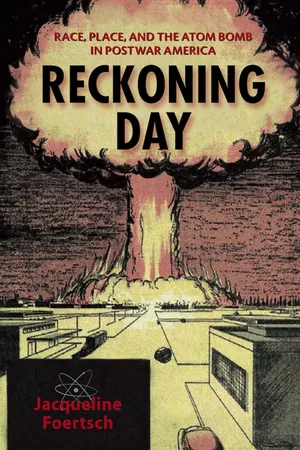
- English
- ePUB (mobile friendly)
- Available on iOS & Android
About this book
Too often lost in our understanding of the American Cold War crisis, with its nuclear brinkmanship and global political chess game, is the simultaneous crisis on the nation's racial front. Reckoning Day is the first book to examine the relationship of African Americans to the atom bomb in postwar America. It tells the wide-ranging story of African Americans' response to the atomic threat in the postwar period. It examines the anti-nuclear writing and activism of major figures such as W.E.B. Du Bois, Rev. Dr. Martin Luther King, Jr., and Lorraine Hansberry as well as the placement (or absence) of black characters in white-authored doomsday fiction and nonfiction. Author Jacqueline Foertsch analyzes the work of African American thinkers, activists, writers, journalists, filmmakers, and musical performers in the "atomic" decades of 1945 to 1965 and beyond. Her book tells the dynamic story of commitment and interdependence, as these major figures spoke with force and eloquence for nuclear disarmament, just as they argued unassailably for racial equality on numerous other occasions.
Foertsch also examines the placement of African American characters in white-authored doomsday novels, science fiction, and survivalist nonfiction such as government-sponsored forecasts regarding post-nuclear survival. In these, black characters are often displaced or absented entirely: in doomsday narratives they are excluded from executive decision-making and the stories' often triumphant conclusions; in the nonfiction, they are rarely envisioned amongst the "typical American" survivors charged with rebuilding US society. Throughout Reckoning Day, issues of placement and positioning provide the conceptual framework: abandoned at "ground zero" (America's inner cities) during the height of the atomic threat, African Americans were figured in white-authored survival fiction as compliant servants aiding white victory over atomic adversity, while as historical figures they were often perceived as "elsewhere" (indifferent) to the atomic threat. In fact, African Americans' "position" on the bomb was rarely one of silence or indifference. Ranging from appreciation to disdain to vigorous opposition, atomic-era African Americans developed diverse and meaningful positions on the bomb and made essential contributions to a remarkably American dialogue.
Frequently asked questions
- Essential is ideal for learners and professionals who enjoy exploring a wide range of subjects. Access the Essential Library with 800,000+ trusted titles and best-sellers across business, personal growth, and the humanities. Includes unlimited reading time and Standard Read Aloud voice.
- Complete: Perfect for advanced learners and researchers needing full, unrestricted access. Unlock 1.4M+ books across hundreds of subjects, including academic and specialized titles. The Complete Plan also includes advanced features like Premium Read Aloud and Research Assistant.
Please note we cannot support devices running on iOS 13 and Android 7 or earlier. Learn more about using the app.
Information
Table of contents
- Cover
- Frontispiece
- Title Page
- Copyright
- Contents
- Acknowledgments
- Introduction. Mapping Ground Zero in Postwar America
- One. “Extraordinarily Convenient Neighbors”: Servant-Savior-Savants in White-Authored Post-Nuclear Novels
- Two. “Tomorrow’s Children”: Interracial Conflict and Resolution in Atomic-Era Science Fiction and Afro-Futurism
- Three. Sidebar: Covering the Bomb in the African American Press
- Four. Against the “Starless Midnight of Racism and War”: African American Intellectuals and the Anti-Nuclear Agenda
- Five. Last Man Standing: Sex and Survival in the interracial Apocalyptic
- Conclusion. “Don’t Drop It, Stop It, Bebop It”: Some Final Notes on Race, Place, and the Atom Bomb in Postwar America
- Notes
- Works Cited
- Index